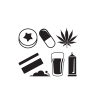DRUGS:
Staying Safe
This big bumper book of drug and alcohol features 10 of the most common substances. It's perfect for anyone who need easy-to-understand harm reduction advice, and accurate information about a range of substances
Growing up can be tough; always under pressure from your friends and family to do the right thing - look right, sound right and behave right.
But, as a young person, what is the right thing when it comes to drugs and alcohol? should you take that white powder or neck that pill? What’s in it, how will it make you feel, what are the risks?
The only way to avoid the risks of using drugs and alcohol is not to use them at all. If you use drugs and alcohol or are thinking about it, it’s essential to learn as much as you can about the substances you are using.
This page provides you with clear, non-judgemental information about some of the most commonly used legal and illegal substances, including:
- Alcohol
- Amphetamine
- Cannabis
- Cocaine
- Ecstasy
- Ketamine
- Nitrous oxide
- Mephedrone
- Solvents
The final section in this booklet is called ‘Staying Safe’. It includes information about mixing drugs and alcohol, feeling unwell, and looking after yourself and your mates.
ALCOHOL
The amount of alcohol in a drink is measured in units. Different drinks have a different number of units. The number of units in a bottle or can of alcohol is printed on the label or packaging.
The effects of alcohol
- Can slow down your brain which, in small amounts, can make you feel relaxed and sociable.
- Can cause slurred speech, blurred vision, confusion, loss of coordination, and heightened emotions, the more you drink.
The problems with alcohol
- Can damage your liver, stomach, kidneys, brain, muscles, skin and bones and causes cancer.
- Can cause impotence (brewer's droop), infertility (shooting blanks), shrink the testicles, and grow breasts, in men.
- May cause loss of periods, infertility (can't have a baby), and fat redistribution, in women.
- Can cause addiction.
- Can result in unconsciousness and sometimes death, if you drink a lot very quickly.
Young people, under 16, should not drink alcohol at all as this can damage developing organs. The best advice is not to drink alcohol until you're 18.
When over 18, men & women should drink no more than 14 units a week, spread evenly across a few days with a couple of alcohol-free days.
Alcohol and the law
If you are under 18 it is against the law for you:
- To sell you alcohol or for an adult to try and buy it on your behalf.
- To buy alcohol, attempt to buy alcohol, or to be sold alcohol.
- To drink alcohol in licensed premises, with one exception - 16 and 17 year-olds accompanied by an adult can drink (but not buy) beer, wine, and cider with a table meal in a pub or restaurant.
Amphetamine
The effects of amphetamines
- Can speed up your heartbeat and breathing.
- Can also cause anxiety, paranoia, irritability, twitchiness and insomnia.
The problems with amphetamines
- Can lead to tolerance, meaning you have to take more to get the same effect.
- Excessive use can lead to psychosis (loss of contact with reality), chest pain, heart problems and high blood pressure.
- Can cause something called formication, which is the excessive itching and scratching of the skin, leading to skin infections.
- The purity of some amphetamines can be as low as 5%.
Amphetamines and the law
- Amphetamines are illegal, Class B drugs.
- Possession of Class B drugs carries a maximum sentence of 5 years' imprisonment and a fine.
- Supplying (selling or giving away) carries a maximum sentence of 14 years' imprisonment and a fine.
Cannabis
Cannabis comes from a plant called Cannabis Sativa.
Cannabis normally comes in a solid brown lump called hash (the resin scraped from the plant), or the dried flowers of the plant, known as grass, weed or Skunk.
The main chemical in cannabis is called THC (Tetra-Hydro-Cannabinol), which is the bit that makes you feel trippy. Different types of cannabis have different levels of THC.
It is normally smoked, rolled with tobacco in cigarette papers, or in a pipe or bong, but it can also be eaten.
The effects of cannabis
- Cannabis can make you feel relaxed, trippy, talkative and giggly.
- It can make you feel tired, lazy and sleepy.
- Can make colours, music and taste seem more intense.
The problems with Cannabis
- Cannabis can cause paranoia, anxiety and panic attacks.
- In some people, cannabis can bring on mental health problems.
- The earlier you start smoking cannabis, the more likely you are to have problems with it.
- Can cause lung damage if smoked.
- Cannabis become a habit and lead to a lack of motivation and problems concentrating at school or work.
Cannabis and the law
- Cannabis is an illegal, Class B drug.
- It is illegal to have, sell, grow or give away.
- If you are under-18 and caught with cannabis your parents or guardian will be contacted, you could get a reprimand and possibly a referral to a Youth Offending Team.
- If you are over-18, a first-time offence will usually get you a 'cannabis warning,' a second offence will get you an on-the-spot fine, and a third offence will result in prosecution and a criminal record.
There are products which claim to have the same effects as cannabis (Spice, Black Mamba, etc.), but these can also be harmful and are illegal under the Psychoactive Substances Act 2016.
Cocaine
Cocaine is a substance obtained from the leaves of the coca plant.
It normally comes in a white powder form. The purity of cocaine can vary greatly throughout the UK, from between 15-55%.
The effects of cocaine
- Can cause an energy rush, and feelings of exhilaration, confidence and wellbeing.
- Can also cause effects like edginess, paranoia, anxiety and shaking.
The problems with cocaine
- Cocaine is normally snorted through a rolled-up note or straw. The cocaine and the chemicals it is mixed with are acid and can burn or damage your nose.
- The note or straw you use may have been up others peoples' noses and can be covered in snot, viruses and germs.
- The initial effects of cocaine only last between 15 and 30 minutes. Using again and again to achieve the same effect can lead to tolerance, where you have to use more and more to get the same buzz further down the line, addiction.
- Cocaine increase blood pressure, heart rate and body temperature.
- Using cocaine increases the risk of stroke or a heart attack.
Cocaine and the law
- Cocaine is an illegal, Class A drug.
- Possession of Class A drugs carries a maximum sentence of 7 years imprisonment and/a fine.
- Supplying (selling or giving away) carries a maximum sentence of life imprisonment and a fine.
Ecstasy
MDMA usually comes in tablet form, known as 'ecstasy', or powder, known as 'MDMA powder.'
Tablets come in various shapes and colours. MDMA powder usually comes in white or off-white crystals or powder.
Remember, not all tablets claiming to be ecstasy or powder claiming to be MDMA, actually contain any real MDMA.
The effects of ecstasy
- Can cause an initial rush, jaw clenching, nausea, and nervousness.
- Can increase energy levels and give a warm 'loved-up' huggy feeling.
- Can cause sounds, colours, and feelings to be more intense.
The problems with ecstasy
- Ecstasy can cause you to overheat, particularly if you are jumping up and down (sometimes called dancing!) in a nightclub and don't drink enough liquid, take a break, or get some fresh air.
- Ecstasy causes your body to retain water (you can't pee!) which alters your body's chemical balance.
- If you also drink a lot of water, this can cause your brain to swell.
- Deaths from ecstasy have often been caused by drinking either not enough or too much water.
- Your body needs about a pint of fluid - water, isotonic drink or fruit juice - an hour, to function properly in a hot environment.
- Ecstasy normally takes half an hour to an hour to start working but can take longer. Being impatient and taking more can increase the dangers.
The comedown from ecstasy can leave you feeling tired and depressed for a few days afterwards.
Ecstasy and the law
- Ecstasy is an illegal, class A drug.
- Possession of Class A drugs carries a maximum sentence of 7 years imprisonment and/or a fine.
- Supplying (selling or giving away) carries a maximum sentence of life imprisonment and a fine.
Ketamine
Ketamine is an anaesthetic that comes in the form of a clear liquid, tablets, or powder ranging in colour from off-white to light brown.
The effects of Ketamine
- The effects of Ketamine vary depending on your environment. In small doses it normally acts as a stimulant, boosting your energy levels, and making you feel high and trippy.
- Larger doses can cause a strange 'out-of-body' effect, with hallucinations, feelings of calm and serenity, distorted reality, panic attacks, unpleasant feelings and fear.
- These feelings can last up to 90 minutes.
- The out-of-body experience is known as being in a 'K hole'.
Physical effects can include loss of control over your body, loss of coordination, difficulty speaking, moving, hearing and seeing (delirium), numbness and nausea.
The problems with Ketamine
Obviously, if you are having an out-of-body experience and can't move your arms and legs, then you're particularly at risk, especially in unfamiliar surroundings.
Because Ketamine is an anaesthetic and numbs your body, you can't feel pain as much as you would normally, so you can injure yourself without realising.
- Regularly using a lot of Ketamine can cause serious bladder problems, with severe pain and difficulty peeing.
- Too much Ketamine can affect your breathing, leading to unconsciousness or heart failure.
- Ketamine can be addictive.
Ketamine and the law
- Ketamine is an illegal, Class C drug.
- Possession of Class C drugs carries a maximum sentence of 2 years imprisonment and/or fine.
- Supplying (selling or giving away) carries a maximum sentence of 14 years imprisonment and a fine.
Mephedrone
Mephedrone (4-Methylmethcathinone) also known as Meph, Meow Meow, M-Cat, is a synthetic chemical, similar to amphetamines.
Usually an off-white powder. Normally found in tablets or capsules. It can have a sharp chemical or fishy/bleachy smell.
Effects of Mephedrone
- Feelings of wellbeing,
- alertness,
- increased confidence and becoming more talkative.
Adverse effects of Mephedrone
- Increased heart rate.
- Palpitations, heavy sweating.
- Blurred vision.
- Hot flushes.
- Irregular heartbeat.
- Nausea, and muscle tension, especially in the face and jaw.
The main after-effects are tiredness, feeling dizzy and feeling low.
The problem with Mephedrone
- Can be mixed with unknown substances.
- Damage to the nose through snorting.
- Anxiety, panic attacks and agitation.
- Raised blood pressure, which can lead to heart problems and strokes.
Stimulants can cause you to overheat, especially if you are bouncing around in a nightclub.
There isn't enough information around at the moment to predict if Mephedrone is addictive or will cause long-term damage to your health.
Mephedrone and the law
- Mephedrone and other cathinone-based substances are illegal to possess, supply or produce.
- It is a class B drug.
- Possession could get you up to 5 years in jail and a fine.
- Supplying (even giving it away) gets up to 14 years in jail and a fine.
Nitrous oxide
Nitrous oxide is a colourless and mainly odourless gas. It's Common street names include laughing gas, noz or noxy.
It comes in small, silver pressurised containers (bulbs) or large canisters, usually transferred from a canister into a balloon for inhaling.
> The effects of nitrous oxide
Users feel light-headed, dizzy, giggly, and euphoric.
You may experience sound distortions and hallucinations – when you see or hear things that aren’t there. It can also cause confusion, headaches, nausea, and paranoia.
> The problems with nitrous oxide
Using pressurised gas directly from a canister is dangerous.
Inhaling in an enclosed space or putting your head in a bag of gas can lead to unconsciousness.
Using it in hazardous locations, like high buildings or close to water etc., is risky.
Prolonged and heavy use can result in vitamin B deficiency and nerve damage.
Symptoms of nerve damage can include numbness or pins and needles in the arms and/or legs.
Excessive use can cause breathing difficulties and heart problems.
The law: nitrous oxide is a Class C drug. Supply or possession with the intention of using it to get high is illegal.
Solvents
Solvents come in many forms, such as household products like glues, lighter fluid and aerosol sprays, and are normally inhaled.
The effects of solvents
- Can cause intoxication (feeling very drunk), dizziness and drowsiness.
- Can cause sickness and vomiting.
- Can lead to aggressive and risky behaviour.
The problems with solvents
- Can cause your heart to beat irregularly or stop, even on first-time use. This can happen whether they are sniffed from a bag, an aerosol or sprayed into your mouth.
- Can cause loss of consciousness. If you use solvents in a dangerous location or place your head inside a bag, there is the added danger of having an accident or suffocating.
- Can cause burning or a rash around your mouth and nose.
Solvents and the law
- It is illegal to supply solvents to persons under the age of 18 if the supplier knows or suspects the product will be sniffed.
Staying safe
Low and slow
Give drugs time to work - rushing to take more is risky. Effects vary based on how you feel, where you are, and what’s in them, so take it slow.
Synthetic opioids
Be aware that drugs are increasingly being mixed with dangerous synthetic opioids like nitazene and fentanyl, which can cause overdose even in tiny amounts. You won’t be able to see, smell, or taste them - take it slow and be careful.
Avoid using drugs alone
Never use drugs alone - it’s dangerous, as no one can help if things go wrong. Have a friend present who knows what you’ve taken. If someone becomes unresponsive, put them in a recovery position (on their side, top knee and arms bent), check their breathing, call 999 and be honest about what they’ve taken so medics can help properly.
Mixing drugs and alcohol
Using drugs and alcohol together can be unpredictable and dangerous, especially since alcohol dehydrates you. Mixing cocaine, ecstasy, or other substances with alcohol can put you at serious risk.
Pre-loading
Having drinks while getting ready might seem like a good way to start the night, but it makes you more likely to get into trouble later. Take it easy - the night’s just beginning!
Pace yourself
Want to make your night last? Have food first, grab water between drinks, and don’t feel pressured to drink every round. Put your drink down between sips - holding it means you’ll drink faster.
Violence
Keep your cool if someone’s giving you grief - walking away might feel tough, but it’s better than getting hurt or in trouble.
Sex
If you’re planning to hook up, bring protection and use it. Emergency options are available if needed - visit your GP, walk-in centre, or pharmacy within 72 hours.
Don't flash your valuable
Keep your phone and valuables safe - consider bringing a backup phone for nights out. Be careful at ATMs - shield your PIN and stay aware of your surroundings.
Keep an eye on your drink
Never leave your drink unattended or take one from someone you don’t trust.
Looking after yourseleves and your mates
We all need to look out for each other! If you’re heading off with someone new, let your friends know where you’re going. Maybe even send them a quick photo of who you’re leaving with.
If a friend’s feeling unwell, get them somewhere quiet and cool, keep them sitting up, and give them water. If they’re not responding, put them in the recovery position and get help immediately.
Getting home safely
Plan your journey home before you go out - it makes everything easier! Pre-book a taxi if you can, and arrange a meeting point in case you get separated from your friends. If you end up walking, stick to well-lit streets and main roads, no matter how tempting those shortcuts might be.
Remember - the best nights are the ones where everyone gets home safe!
Drugs and the law
What happens if you're caught with drugs, what will the police do, what are the legal options?
Supplying Drugs
Supplying illegal drugs includes possession with intent to supply, or give away for free to friends, and will almost certainly result in a criminal record, severe sanctions and possibly prison time.
Maximum penalties range from 14 years for Class C drugs to life imprisonment for Class A drugs.
Possessing Drugs
It’s illegal to be in possession of drugs and can get you from 2 to 7 years in custody, depending on the class of drug.
Out of court resolutions
If you’re found with a small amount for personal use, some police forces will take a different approach. They might opt to deal with the matter using what’s known as Out of Court Resolutions (OoCRs), with the following aims:
- Keep you out of the court system
- Help you address issues around drug use
- Divert you from repeat offending
Types of OoCRs
Community resolution: the police can make you attend an educational course on drugs and their anti-social effects to try to address the cause of your drug use.
Conditional caution: the police could opt for this if you’re a repeat offender when it’s not in the public interest to prosecute. It can include some kind of intervention to address drug use, such as referring you to a drug and alcohol service or other agency. It goes on your criminal record.
Restorative interventions: the police can consider these alongside a community resolution or conditional caution. You might need to attend drug awareness sessions or do community work and educational programmes.
OoCRs for children and young people
- Youth community resolution
- Youth caution
- Youth conditional caution
Additional things to consider
Failure to complete or engage with OoCRs will land you in court for the original offence.
If you’re under 18, the police are likely to inform your parents or carers.
A drug possession conviction can impact your life, such as restricting travel abroad (e.g. the US), or affect job opportunities.
More drugs information
-
FRANKCall 24 hours a day, 365 days a year, FRANK is around to give you FREE info on drugs.
-
RELEASERelease is the national centre of expertise on drugs and drugs law – providing free and confidential specialist advice to the public and professionals.. Helpline 0845 4500 215
-
NHSAdvice, tips and tools to help you make the best choices about your health and wellbeing.













